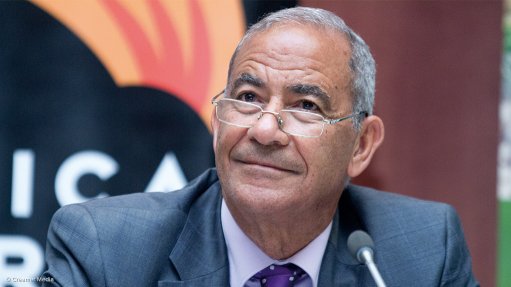
Professor Mosad Elmissiry
Photo by: Duane Daws
The African Union’s New Partnership for Africa’s Development (Nepad) Agency have signed a memorandum of understanding with USAID outlining new commitments to the implementation of the Power Africa Initiative, which was unveiled by President Barack Obama in 2013.
Nepad Agency CEO Dr Ibrahim Mayaki and USAID’s assistant administrator for Africa Earl Gast initialled the deal at a function in Johannesburg on Thursday.
The MoU comes after Obama’s August announcement that the private-sector-driven Power Africa had been scaled up and would now seek to provide energy access to 60-million households and businesses over the coming five years.
Nepad Agency energy division head Professor Mosad Elmissiry told Engineering News Online that the programme was mostly aligned with the pipeline of 15 priority energy projects identified by under Nepad’s Programme for Infrastructure Development in Africa (PIDA). These projects included power generation schemes, such as the Inga 3 hydropower project in the Democratic Republic of Congo, several cross-border transmission corridors and oil pipelines.
However, USAID would focus primarily on projects in the six African countries receiving priority under Power Africa, namely Tanzania, Kenya, Ethiopia, Ghana, Nigeria and Liberia.
Private companies would implement all Power Africa projects, but USAID would offer technical assistance to progress projects towards “bankability”. It would also support the appointment of project transaction advisers.
Elmissiry says a list of projects would be identified for accelerated implementation. But he also notes that Power Africa is but one of three energy-related initiatives currently being pursued across Africa.
Besides the PIDA pipeline opportunities would also arise from the Africa Power Vision (APV), which was endorsed by a number of Heads of States at the World Economic Forum, in Switzerland, earlier in the year.
A list of APV projects was expected to be published before the end of the year and a number of other countries and development finance institutions had indicated a desire to participate in the implantation of these projects.
Work was also advancing in parallel on a number of Sustainable Energy for All projects, where an aspiration had been set to double the share of renewable energy in the African energy mix by 2030, while also doubling the rate of improvement in energy efficiency.
Elmissiry was sanguine about the number of initiatives under way designed to boost African energy supply and access. “Our strategy now is to use what is common across the three main initiatives.”
He said the 15 PIDA programmes alone comprised 50 individual projects. “So we could need even more initiatives to ensure full implementation.”